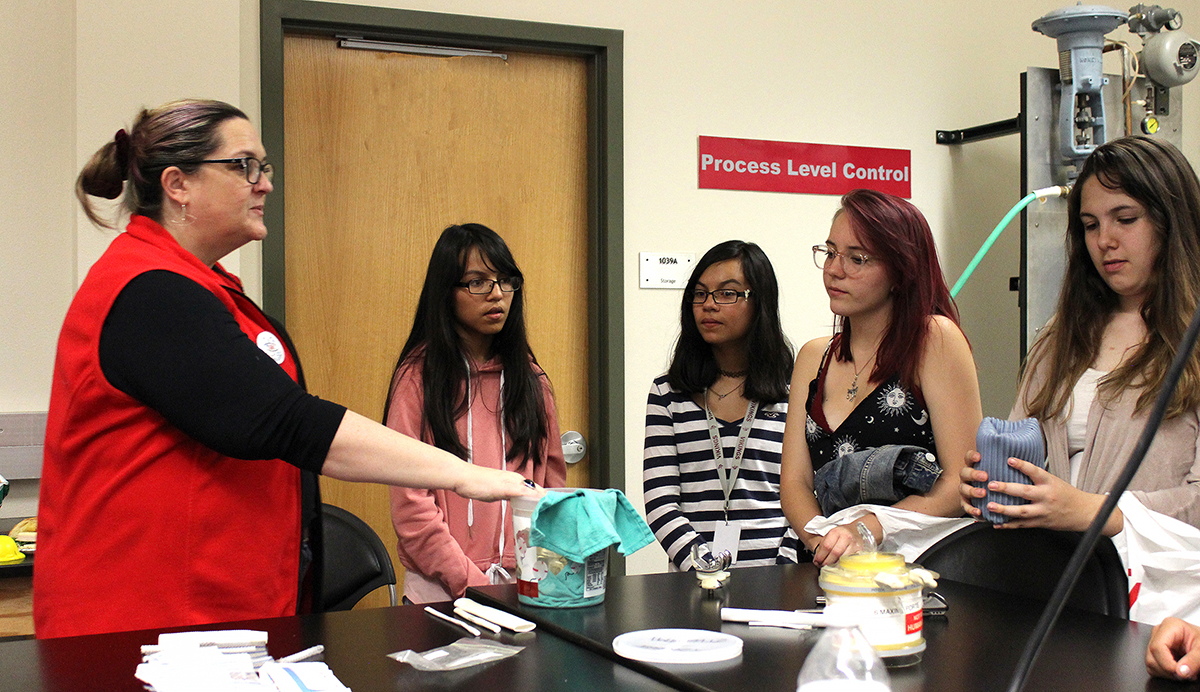Recent News
EPA awards UNM $7M to support small water systems
May 29, 2025
Computer scientist wins Athlete of the Year Award for adaptive skiing technique
May 27, 2025
UNM to host first-ever residential nuclear engineering camp
May 20, 2025
UNM Regents' Scholar Rebecca Nez named 2025 Udall Scholar
May 15, 2025
News Archives
School of Engineering receives National Science Foundation grant for student success, retention
September 2, 2020 - by Kim Delker

Professor Heather Canavan, co-PI on the grant, giving a demonstration to prospective high school students at the School of Engineering Open House in September 2019.
A research team in the School of Engineering at The University of New Mexico has been awarded funding from the National Science Foundation (NSF) for a project to uncover new ways to promote academic success and retention among engineering and computer science students.
“Scholarships, Service Learning, and Community Engagement to Improve Student Success in Engineering and Computer Science” is a five-year project that begins January 1, 2021, and totals nearly $1 million.
The ultimate goals, said principal investigator Tariq Khraishi, are to help engineering students succeed academically and also to provide data on approaches that work best in the retention of students, ensuring their academic success, and ultimately getting them to graduation.
“Retaining engineering students is a universal challenge, but this is especially true among engineering and computer science students at UNM,” said Khraishi, who is a professor of mechanical engineering. “When you consider factors such as family income, educational attainment of parents, and other factors, many students at UNM face additional barriers in completing an engineering degree. With this project, we’d like to identify services, programs, and activities that can be proven to help our students succeed.”
A recent study by the School of Engineering found that UNM engineering students on average have a lower retention rate than UNM students in other majors (39% for engineering students vs. 65% non-engineering by semester 6). Further, Pell Grant-eligible (which indicates high financial need) and first-generation students in the School have lower retention rates.
The project addresses the goals of the NSF Scholarships in STEM (S-STEM) Program, which include improving the education of academically-talented, low-income STEM students by supporting them to achieve academic success (including retention and graduation). In addition to helping students, the project will collect data on the cohorts of students and generate new knowledge about best practices — what works and what doesn’t work — in retaining these students.
Khraishi said the project will fund scholarships for 120 full-time bachelor students in engineering or computer science (up to $5,000 a year for 24 students annually) over the course of the five-year project, with a special emphasis on academically talented, low-income STEM students. The project will be coordinated through the School of Engineering’s Engineering Student Success Center by Anyssa Romero Choy.
All S-STEM scholars in the program will go through career development activities and will be mentored in a learning community environment with faculty mentors. Students in the program will also be tasked with service learning/community engagement activities, either through paid internships or honors/problem courses, for which they will receive academic credit. Students in the program will work with non-engineers in local nonprofits organizations and tribal communities, who will serve as mentors, to collaboratively develop a technical project that will benefit the community.
Khraishi said that the need for more engineers, computer scientists, and others in technical fields is well-known, and the hope with this study is to find clues as to what kinds of programs, activities, and support systems work best in retaining promising, high-achieving students who have financial need.
“Given UNM’s student population, many of whom are first-generation college students with high financial need, this project has the potential to change the way engineering and computer science programs are administered, leading to greater student success.”
Co-principal investigators are Heather Canavan, professor of chemical and biological engineering; Trilce Estrada, associate professor of computer science; Maryam Hojati, assistant professor in the Department of Civil, Construction and Environmental Engineering; and Christos Christodoulou, Jim and Ellen King Dean of Engineering and Computing and Distinguished Professor in the Department of Electrical and Computer Engineering.
The project is funded from Division for Undergraduate Education and the S-STEM programs of the NSF.
For student inquiries about this program, please contact nsfstem@unm.edu
